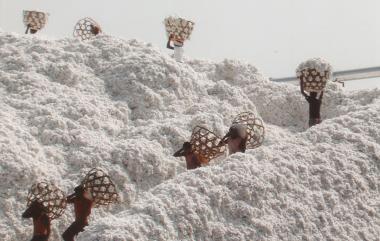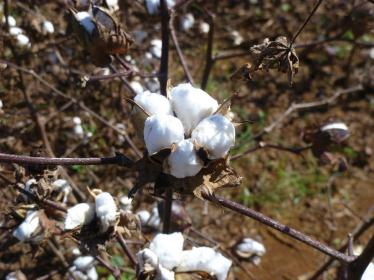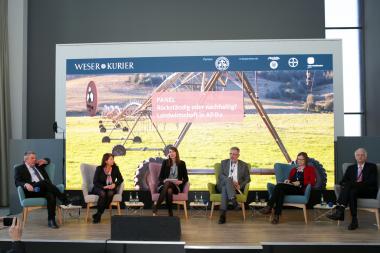35. Internationale Baumwolltagung Bremen – The Hybrid Edition
- Passion for Cotton!
- Topthema: Verantwortung. Auch bei der Rohstoffproduktion
Verantwortungsvolle Faserproduktion, technischer Fortschritt, Biobaumwolle vor Ort, nachhaltige Wollproduktion und noch mehr Baumwolle als Plastikersatz
Die Bremer Baumwollbörse und das Faserinstitut Bremen laden am 17. und 18. März unter dem Motto ‚Passion for Cotton!‘ zur Hybridausgabe der Internationalen Baumwolltagung Bremen ein. Mit hochkarätigen, informativen Vorträgen, abwechslungsreichen Diskussionsrunden sowie seinen Interaktionsmöglichkeiten wird das Treffen der Weltbaumwoll- und Textilwertschöpfungskette seinem hohen Ansehen in der Branche auch diesmal wieder gerecht.
Dabei scheut man sich nicht auch Themen aufzugreifen, die in der Öffentlichkeit häufig im Fokus der Kritik stehen. Ein Beispiel dafür ist die zweistündige Paneldiskussion am Mittwoch, dem 17. März, bei der es um die Beantwortung wesentlicher Fragen zu Prozessen und Verfahren verantwortungsbewusster Faserproduktion geht. Hier sollen aktuelle und zukünftige Standards gegenübergestellt und verglichen werden.
Mark Messura, Senior Vice President der Global Supply Chain Marketing Division bei Cotton Incorporated, Cary, USA, leitet die Paneldiskussion. Er blickt in seiner Laufbahn auf eine 27-jährige Erfahrung bei Produktionsverfahren und der Vermarktung von Baumwolle zurück.
Seine Diskussionspartner sind fünf Teilnehmerinnen, die in Bereichen der Agrarforschung und der Naturfaserproduktion sowie bei Nichtregierungs-organisationen tätig sind.
La Rhea Pepper: Sie gehört der fünften Generation einer texanischen Baumwollfarmfamilie an. La Rhea Pepper ist Expertin für Biobaumwollanbau und Chief Executive Officer (CEO) von Textile Exchange. Als weltweit operierende Non-Profit-Organisation verfolgt Textile Exchange das Ziel, gemeinsam mit ihren Mitgliedern nachhaltige Produktionsstandards für unterschiedliche Faser- und Materialgruppen zu entwickeln.
Jessi Christiansen ist seit 2018 Global Manager Cotton, Sorghum & Alfalfa für Bayer Crop Science, St. Louis, USA. Zuvor war sie zehn Jahre in verschiedenen Führungspositionen für den Monsanto-Konzern tätig. Als führendes Unternehmen in der Agrarwirtschaft kann Bayer die Zukunft der Landwirtschaft für Landwirte, Verbraucher und unseren Planeten prägen - durch wegweisende Innovationen, neue Standards bei der Nachhaltigkeit und eine beschleunigte digitale Transformation. Bayer investiert weiterhin in erheblichem Umfang in die Baumwollindustrie. Insbesondere zeigt sich dieses Engagement in der robusten Entwicklungspipeline, die das stärkste Keimplasma und die erfolgreichsten biotechnologischen Merkmale der Branche hervorbringt. Mit seinem gebündelten Know-how aus Saatgutzüchtung, Biotechnologie und digitaler Entwicklung steigert Bayer Crop Science sowohl die Erträge und Faserqualität als auch die Widerstandsfähigkeit von Baumwolle weltweit.
Dalena White ist General Secretary der International Wool Textile Organisation (IWTO) in Brüssel. Seit 1930 vertritt die IWTO die gemeinsamen Interessen des internationalen Wollhandels und sorgt durch Maßnahmen im Bereich Forschung, Beratung und Information für eine auf Nachhaltigkeit basierende Zukunft der Naturfaser Wolle und ihrer Verarbeitung zu Textilien.
Janet O’Regan ist Director Nonwovens Marketing for Cotton Incorporated, USA. In dieser Position evaluiert sie Einsatzmöglichkeiten für Baumwolle im Bereich von Vliesstoffen und weiteren nicht traditionellen Märkten. Gleichzeitig entwickelt sie Strategien zu deren Vermarktung. Sie stellt ein Verfahren zur Verarbeitung von Baumwolle zu einem plastikähnlichen Material vor. Das soll helfen, den Verbrauch erdölbasierter Einweg-Plastikprodukte zu verringern, wie es die Europäische Union mit ihren geplanten Verordnungen anstrebt.
In der Paneldiskussion wird auch ein Vertreter der Better Cotton Initiative mitwirken. BCI ist in ausgewählten Ländern seit Jahren darin engagiert, den Baumwollanbau von Farmern auf Basis regionaler Gegebenheiten kontinuierlich zu verbessern. Dabei können die Projekte unterschiedliche Schwerpunkte haben.
Doch damit nicht genug: Unter der Headline ‚Passion for Sustainability‘ findet am Donnerstag, dem 18. März nachmittags eine Session statt, in deren Mittelpunkt Projekte des nachhaltigen Baumwollanbaus stehen.
Vivek Kumar Rawal, CEO and Director, bioRe India Ltd. berichtet über Herausforderungen und Perspektiven beim Anbau von Biobaumwolle in Indien. Eine wesentliche Aufgabe sieht Vivek Kumar Rawal darin, den Biobaumwollsektor und die Entwicklung von GMO-freiem Saatgut voranzutreiben.
„Passion for Sustainability in Cotton“ lautet das Thema des Vortrags von Suzanne Barratt. Sie ist Manager Communication for Field Crops, Seeds & Traits in der Region Europa, Mittlerer Osten und Afrika bei der französischen BASF-Tochter in Lion. Sie berichtet über Ergebnisse beim Einsatz des ‚Certified Sustainable FiberMax®-Program‘ in Griechenland.
 © Bremer Baumwollbörse
© Bremer Baumwollbörse
 © Bayer Crop Science
© Bayer Crop Science
 © Cotton Incorporated
© Cotton Incorporated
 © Textile Exchange
© Textile Exchange
 © Cotton Incorporated
© Cotton Incorporated
 © IWTO
© IWTO
Baumwolltagung Bremer Baumwollbörse Baumwolle Sustainability Rohstoffproduktion Nachhaltigkeit
Bremer Baumwollbörse


































